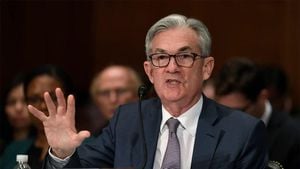China’s leadership has kicked its efforts to stabilize the nation’s real estate market up several notches recently, ramping up measures aimed at stabilizing housing prices and restoring confidence among buyers and investors. With the property sector being the cornerstone of the Chinese economy, these efforts may signal a turning point for what many see as the world’s second-largest economy.
According to analysts at Goldman Sachs, the recent moves by policymakers point to what they describe as an inflection point. Yi Wang, head of the China real estate team at Goldman Sachs Research, stated, "We are finally at an inflection point of the continuing downward spiral in the housing market. This time is different from previous piecemeal easing measures, in our view." The gravity of the problem cannot be overstated: if one was to measure the unsold housing inventory, it would roughly amount to RMB 93 trillion, which translates to about $13 trillion.
This huge number reflects just how much real estate remains unsold, which according to Goldman Sachs estimates, increases the urgency for government intervention. They predict the total property sales this year will hover around RMB 9 trillion, viewing the disparity as alarming. Without solid steps to address this institutional gap, there's public apprehension about the future of the housing market.
Goldman Sachs offers another dire outlook: without sufficient government intervention, property values might plunge by 20% to 25%, effectively reducing prices by nearly half compared to their peak. Despite these unsettling forecasts, there's cautious optimism. The investment bank projects the measures now being implemented could stabilize home prices by late 2025.
Incremental government initiatives aimed at addressing the housing oversupply are seen as key to reversing the fortunes of the beleaguered property market. Goldman states, "Incremental government implementation of housing destocking will provide much clearer visibility for the housing market to stabilize over the coming years." But will it be enough?
Backtracking just a notch, it’s important to note the failures of earlier government measures. A significant amount of support—RMB 300 billion—was designated to facilitate loans for state-backed enterprises aimed at purchasing completed, but unsold houses. An even heftier RMB 4 trillion was devoted to pushing project completions. Yet, these attempts have encountered considerable hurdles, including poor execution and insufficient stimulus to respond to the scale of the issue. Peter at Goldman Sachs warned, "Without additional stimulus, the housing downturn could last another three years." So, it remains to be seen whether the fresh policy measures will break this pattern of stagnation or if the ghosts of past initiatives will loom large.
The government has now introduced plans for additional fiscal stimulus possibly reaching around $1 trillion, which they believe can go far toward stabilizing the housing market living crisis. This ambitious approach encompasses resources intended to reduce unsold housing stock and offer help with large construction backlogs. Addressing uncompleted housing units is especially needed as it will aid developers still carrying burdens of presold but unfinished properties. Wang reiterated this could significantly improve market sentiment: "This will be key to boosting confidence among market participants," she emphasized.
Nevertheless, regulatory oversight remains intense. Goldman Sachs points out several previous initiatives to boost the economy created temporary enthusiasm but were followed by letdowns. It remains imperative to monitor how effectively the government executes these new stimulus plans. Investors and potential buyers are also keeping their eyes peeled for signs of recovery, especially within prices for properties within affluent cities, where demand typically finds footing quicker.
Observing trends is made even more complicated by both domestic and global factors. We've already seen the tolls of external economic stress, making it challenging for potential buyers and sellers to make decisions grounded solely on optimism. Yet, the real estate narrative grows more complex as time goes on.
Experts note there are significant risks to be managed surrounding China’s property sector. Drawing parallels, analysts recall the property market downturn witnessed by Japan during the early 1990s. Factors like stagnate demographics, challenging macroeconomic conditions, and deflationary trends can all dampen what could otherwise be rebounds in property prices. Goldman Sachs scholars outline how historical similarities can give us pause for thought as actual recovery takes shape.
Further complicate matters is the concern over market fundamentals and consumer confidence. Should the government respond with vigor and enough resources to inspire confidence, it’s plausible some segments of the market may rebound sooner than others. Still, it remains precarious; the future stability of China’s housing market hinges on government actions and the wider economic climate.
For real estate enthusiasts and industry observers, the stakes couldn’t be higher. Accounting for roughly 29% of the country's GDP, the property market’s health is integral to the overall economic balance. Any misstep can have ripple effects through the economy. It’s anticipated this will come to head as investors, buyers, and industry stakeholders look for signs of longevity and stability.
So, can China’s real estate market truly find a stable ground? With the implementation of substantial fiscal stimulus and hopeful economic indicators, the stage is set for what could be a significant transformation. But as with many upward moves, the path is fraught with uncertainty and risk.
Time will tell if China’s real estate sector has truly reached the bottom, and whether optimism will turn to reality or simply remain another chapter of uncertainty. For the average buyer eyeing property investment, it’s become even more prudent to stay informed on outcomes stemming from these latest governmental actions.



